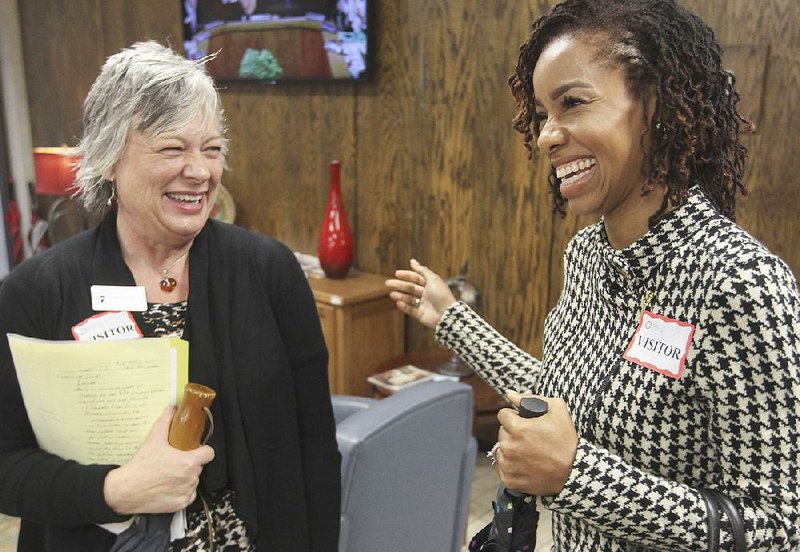An Arkansas Department of Education panel on Tuesday gave preliminary approval to what is on track to become the state's second virtual academy and to a school with an agricultural-science theme.
The Charter Authorizing Panel's split decisions approving both the Bentonville-based Arkansas Connections Academy and the Scott Charter School in the Scott community of Pulaski County will go to the Arkansas Board of Education later this year for the final action they need to begin operations in August 2016.
The panel voted 5-2 for the virtual statewide academy, which would contract with a national education program provider to help students fulfill personalized learning plans that are intended to prepare them for post-secondary education and/or careers.
It would follow the Arkansas Virtual Academy, another statewide online charter school. That academy contracts with K12 Inc. for its educational program.
The proposed school, which was endorsed Tuesday by Sen. Bart Hester, R-Cave Springs, and Rep. Jim Dotson, R-Bentonville, would ultimately serve as many as 3,000 students in kindergarten through 12th grade across the state, starting with up to 600 in kindergarten through ninth grade in the coming school year.
Dennis Beck, president of Arkansas Connections Academy Inc., the sponsor of the planned statewide virtual school's board of directors, told the panel that the school will be distinguished in part by the technology and field trip subsidies to students who come from low-income families.
"Students who have unique needs will be attracted to the school," said Beck, who is also a faculty member at the University of Arkansas at Fayetteville. "They might be a child actor, or they may be athletes who are not able to attend a brick and mortar school because they are often traveling.
"There may be students who may not be able to keep up in a traditional school," he added. "There are a lot of higher functioning students on the autism spectrum who often enroll in online schools because there tends to be fewer distractions in working in a home environment. And there are students who are medically ill or physically challenged and it's very difficult to attend on a regular basis. It's all of the above."
State-licensed teachers, who will be based primarily in Bentonville, would work with students and their parents or other "learning coaches" in online and face-to-face settings.
Instruction would be based on Arkansas education standards. Computers and necessary software would be loaned upon request to low-income families. Additionally, all households in which the students are eligible for free and reduced-price school meals will be eligible for a monthly subsidy of $17.50 or $26.25 for their Internet connections.
Arkansas Connections Academy Inc. had initially sought a waiver to allow it to contract with Connections Academy for the school's education program. Connections Academy, a division of Connections Education, provides the education program for some 36 online schools elsewhere in the country, including Texas.
The Arkansas school planners continue to work closely with Connections Academy's national staff. However, in response to questions about competitive bidding that were raised by Charter Authorizing Panel members during an October meeting, the planners said Tuesday they will issue a request for proposals from education program providers and select a provider from among the responses, which would include Connections Academy.
The proposed school's budget anticipates first-year expenditures of $3.9 million, including $2.1 million for contracted services to Connections Academy if it is the selected provider. Contracted services include administration, regular classroom instruction, special education, gifted and talented education, fiscal services, and maintenance and operations.
Charter Authorizing Panel members questioned Beck and Connections Academy leaders about available support for English-language learners and special education students, the availability of state-licensed teachers in all fields, socialization opportunities for virtual school students, and opportunities for students to take career and technical education courses as part of the high school program.
Beck said the Arkansas school will provide funding to help needy students afford field trips and other group programs. Patricia Hoge, the organization's chief academic officer, said the school offers 16 Advanced Placement Courses and 32 career and technical education courses.
Melissa Nelson, vice president of schools for Connections Academy, said that if the organization can't find qualified teachers in the Bentonville area, it can seek out and hire teachers elsewhere in the state who can still work with students online.
Debbie Jones, Arkansas assistant commissioner for learning services, pointed out that students in Connections-affiliated schools around the country had a 53.9 percent pass rate on state math exams, which was lower than the overall 67.1 percent pass rates in their states. In reading language arts, the Connections-affiliated schools had a 72.6 percent pass rate, slightly higher than the 71.3 percent pass rate overall.
Jones cited the concern about relatively low math achievement when she and Ivy Pfeffer, assistant commissioner for licensure, voted against the proposal.
Deputy Education Commissioner Mark Gotcher, along with assistant commissioners Annette Barnes, Eric Saunders, Greg Rogers and staff attorney Jennifer Liwo, voted in support.
Gotcher said the applicant had aptly demonstrated that family poverty would not be a barrier to students enrolling in the virtual school.
Scott Charter School
The Charter Authorizing Panel voted 4-2 in favor of the Scott Charter School that would start as an elementary school in a farming region of the east part of Pulaski County and expand into the middle and high school grades in later years, serving as many as 975 students.
Academics Plus Charter School Inc. of Maumelle, sponsor of Maumelle Charter Elementary and Maumelle Charter High School, is one of the state's oldest charter school organizations and the sponsoring organization for the proposed Scott Charter School. The organization is seeking an amendment and license based on its existing charter with the state and not a new charter for the Scott school.
"We definitely see a need for this community to have a school," Academics Plus Charter School Inc. Executive Director Rob McGill told the panel. He said his Arkansas-based organization is at a point where it can expand its school program, which he said has earned "A" grades from the state.
Scott school planners would like it to be housed in the elementary school building that the Pulaski County Special School District operated until this year. The district closed the school to save money, and most pupils were assigned to Harris Elementary in the McAlmont community about 12 miles away.
Diane Gross, Maumelle Charter Elementary School principal, said Tuesday that the planners are in negotiations with the Pulaski County Special district to acquire the building.
Pfeffer said she would prefer to know whether the negotiations are going to be successful. The school's plan to incorporate agricultural science into the curriculum would be affected if the school has to find a different location, Pfeffer said.
In response to questions, McGill said there is no plan to provide school buses. However, the school will stay open daily until 6 p.m. to give parents time to pick up their children at the end of the workday.
Panel members Pfeffer and Liwo voted against the school, in part because of concerns about its impact on desegregation efforts in the surrounding Pulaski County Special School District.
That district, which remains under court supervision of its desegregation efforts, had submitted letters in opposition to the open-enrollment charter school. State law says that charter schools are not to delay or hinder desegregation efforts in a traditional school system.
Scott Smith, executive director of the Arkansas Public School Resource Center, told the panel on behalf of the Scott school plan that the federal court had determined that charter schools did not have a segregative impact on Pulaski County area public schools. He said he didn't anticipate that the Scott school would be a problem.
Panel members Jones, Barnes, Saunders and Rogers voted for the Scott Charter School plan.
Metro on 11/18/2015

